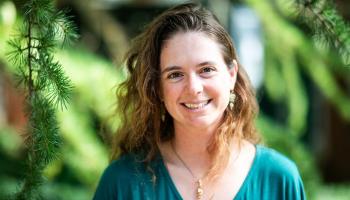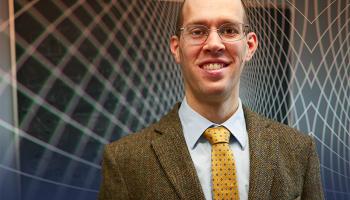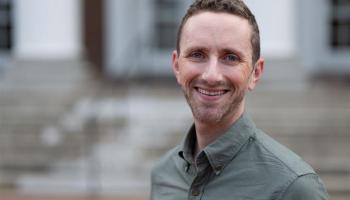UVA Mathematician J.D. Quigley Awarded NSF CAREER Grant
For most of us, living in a three-dimensional world is challenging enough, especially before we’ve had that first cup of coffee in the morning. Just imagine, then, the challenge for physicists, data analysts and even machine-learning algorithms trying to navigate much more complex, high-dimensional spaces created by so many variables that they can be impossible to visualize, much less analyze.
The roadmap, however, may just be a better understanding of symmetry — mathematical symmetry that is — and J.D. Quigley, an assistant professor in the Department of Mathematics at the University of Virginia, has been awarded a prestigious CAREER grant from the National Science Foundation to chart that clearer path. The award, totaling just under $500,000, will support Quigley’s research project on symmetry in high-dimensional geometry, topology and algebra over the next five years.
Quigley’s project, titled “Symmetry in Geometry, Topology, and Algebra,” aims to investigate the complex symmetries of high-dimensional problems. While symmetry in low dimensions is familiar to most of us — such as the reflectional symmetry we experience when we see our faces in a mirror or the rotational symmetry of a spinning wheel — high-dimensional symmetry is far more intricate and less intuitive. Quigley’s research will use modern algebraic techniques to classify these symmetries and understand how they work.
“Symmetry allows us to reduce the complexity of high-dimensional problems,” Quigley explained. “For example, in a high-dimensional dataset, it’s often useful to be able to say that there’s some sort of symmetry in the problem, because it might reduce you from, say, 100 dimensions to 99 or 50 or even less.”
The practical applications of Quigley’s research are vast, extending to fields such as biology, medicine and data analysis. By understanding the shape and symmetry of high-dimensional data, researchers may be able to make more accurate predictions and develop more effective solutions. This has implications for everything from the development of new industrial materials to medical diagnostics.
Topological data analysis, Quigley said, could help researchers better understand why diseases affect some people and not others and understand why specific therapies affect patients differently.
Inspiring The Next Generation of Mathematicians
In addition to his research, Quigley is committed to enhancing access to mathematics education. His CAREER grant includes a significant outreach component aimed at increasing student engagement with mathematics at both the undergraduate and K-12 levels. Toward that goal, Quigley has been co-organizing the Electronic Computational Homotopy Theory Online Research Community since 2019. The group connects researchers who are interested in the study of algebraic structures and spaces and offers specialized courses and research opportunities to students and researchers worldwide.
“Professor Quigley stands as an exemplar of the very best of UVA’s academic missions—combining excellence in teaching, groundbreaking research, and deep community engagement, all while inspiring and supporting the next generation of mathematicians,” said Christa Acampora, dean of the College and Graduate School of Arts & Sciences. “We are grateful to the National Science Foundation for recognizing Professor Quigley’s outstanding contributions and the critical role of mathematics in driving scientific breakthroughs.”
Quigley’s outreach efforts also include community-engaged teaching initiatives. He has been teaching upper-division math classes that incorporate community service and involve partnerships with local high schools to introduce students to advanced mathematical concepts. Those efforts also include a collaboration with Starr Hill Pathways, a Charlottesville-based college and career readiness program, to pair UVA math students with local high school students for free tutoring. The projects not only enrich the learning experience for UVA students, Quigley said but also help to address educational disparities in the local community.
“I’m teaching a graduate class in topology, and my students and I were able to work with a geometry class at a local high school,” Quigley said. “We had the opportunity to introduce them to activities related to topology and hopefully got them a little excited about math they wouldn’t see otherwise.”
The NSF CAREER grant will support additional research and outreach activities, including organizing regional workshops and conferences, conducting long-term studies on the effects of community-engaged teaching, and providing resources for students to participate in these initiatives.
“It’s an honor to receive a CAREER grant,” Quigley said, “But I’m especially happy that the community-engaged work that I’m doing is being recognized.”
Ken Ono, Marvin Rosenblum Professor of Mathematics and STEM advisor to the UVA provost, recognized both Quigley’s contributions to the community and his importance to his UVA colleagues. “J.D.’s extraordinary impact in educational outreach is truly outstanding, setting a new standard in the field, and he is an exceptional asset to the UVA community, bringing invaluable expertise to UVA’s premier research group in topology,” Ono said.







